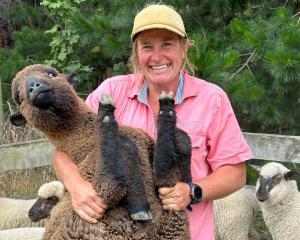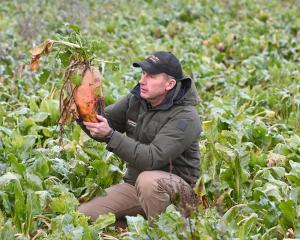
That place was South Otago, a district he first moved to as a stock agent and later returned to as an accountant, the rural lifestyle it afforded suiting him.
"I feel a bit uncomfortable being in the middle of a city. I’m not sure I could live in an apartment ... drinking latte coffees. It’s not really me. I like open spaces," he said.
Jimmy’s father was a bank manager, hence the family’s move every two or three years.
After completing an agricultural commerce degree at Lincoln, his first job was as a Wrightson NMA stock agent in Clinton.
He later switched to studying accounting at the University of Otago and spent three years in a large Dunedin accounting practice and seven years in the rural sector, principally in rural finance.
In 1991, he joined Balclutha firm Shand Thomson where his wife Susie, who was from the Catlins, was already working. He became a partner in 1999.
Jimmy was widely recognised for his work in the agri-sector; as a pioneer and leader in key performance measurement, benchmarking and improvement metrics for farming businesses and for his wise and practical approach to farm succession solutions.
His nomination said he was highly respected by his clients, professionals and communities in which he worked.
His broad agricultural expertise was acknowledged with his appointment to the Institute of Chartered Accountant’s primary sector committee where he served for five years.
The Institute (now Chartered Accountants Australia & New Zealand) recognised his community and professional contributions by awarding him fellowship status in 2006.
As a result of large-scale health sector reforms, Jimmy has a long history of assisting community-owned organisations to successfully take over and maintain the provision of health services to rural communities.
"I think it’s really important rural communities have access to health services commensurate with what’s available in urban settings, it just has to be structured differently," he said.
South Otago had been very good to Jimmy and Susie and he enjoyed working with rural communities. At Shand Thomson, the team were also encouraged to work with community organisations.
Jimmy was the inaugural chairman of Sport Clutha and served on the Rosebank Primary School board of trustees. One of his most satisfying projects had been the development of the museum in Owaka, recognised as one of the best small museums in New Zealand.
More recently, he had been involved in an advisory capacity with the Clutha Community Hub development — a "fantastic" building which was for "everyone" in the Clutha district.
South Otago was not alone; other rural communities were filled with "really good people, all working to do their bit".
"That’s what people do, roll their sleeves up," he said.
















